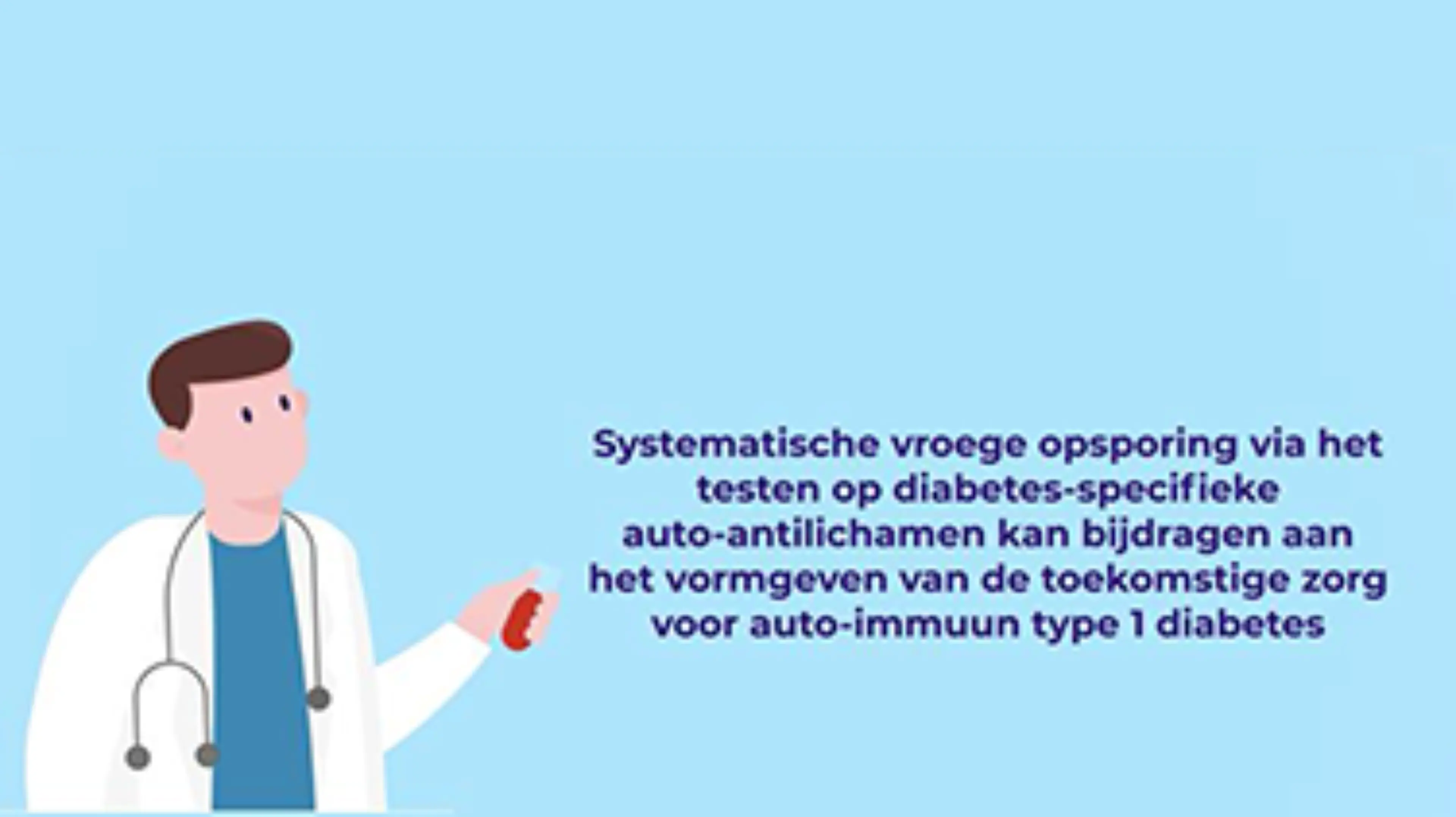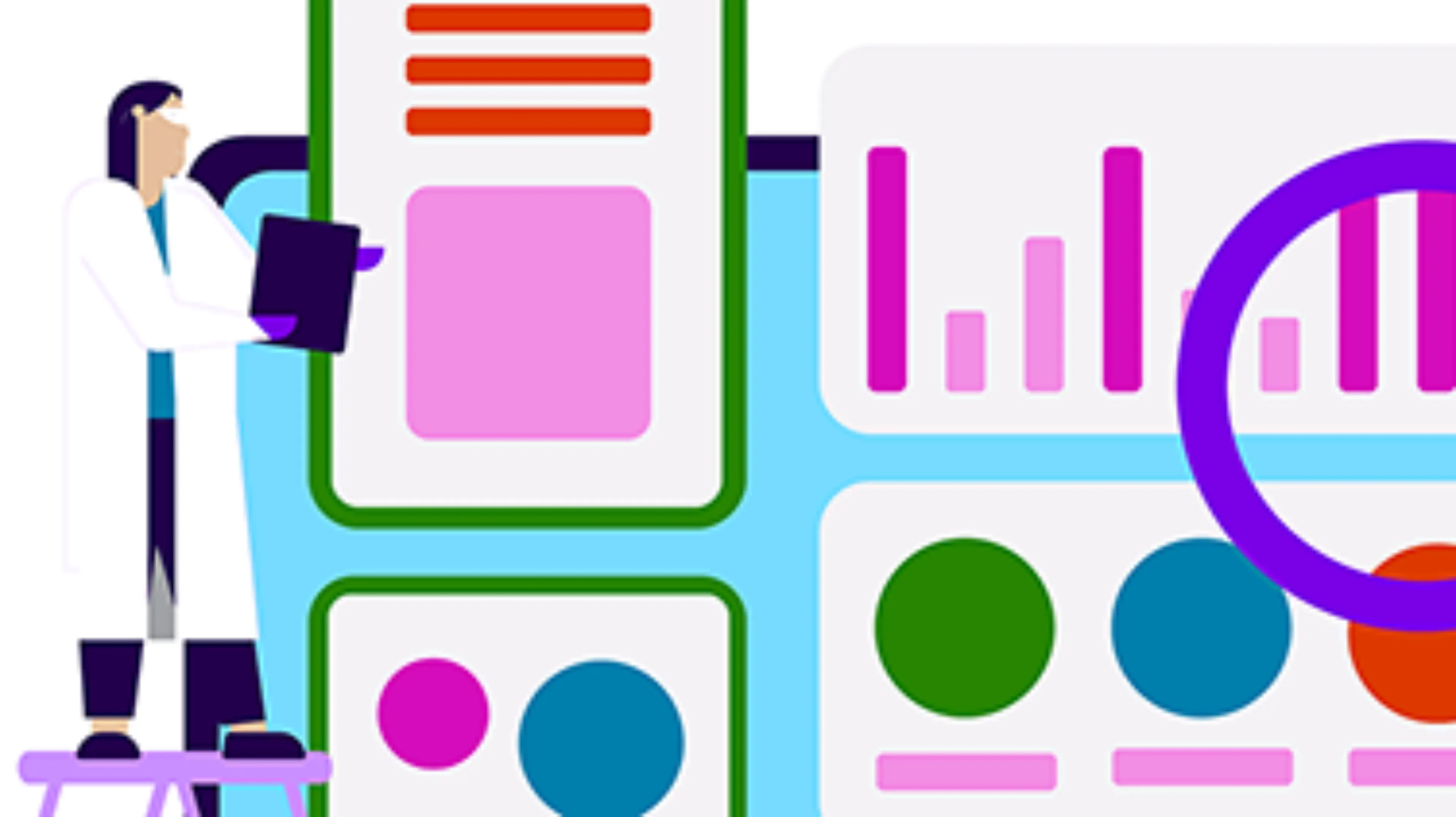- Artikel
- Bron: Campus Sanofi
- 6 okt 2025
Autoimmune Type 1 Diabetes

CURIOUS ABOUT AUTOIMMUNE TYPE 1 DIABETES?
Click on LEARN MORE below to dive deeper into topics that are in the interest of people who live with autoimmune Type 1 Diabetes.

The story of the Beta Cells and their role in autoimmune Type 1 Diabetes
Autoimmune type 1 diabetes (T1D) is driven by the progressive and irreversible loss of beta cells. While exogenous insulin therapy is effective, it cannot fully replicate the full spectrum of functions that beta cells perform in maintaining glucose homeostasis.

Understanding Autoimmune T1D & The Value of Early Detection
Autoimmune Type 1 Diabetes (T1D) can be detected through islet autoantibody testing years before symptoms appear. The video here explains how the condition progresses silently through presymptomatic stages, with beta cell destruction occurring long before symptom onset and clinical diagnosis.

When a Child Gets Autoimmune Type 1 Diabetes
Parent's experiences of stage 3 diagnosis of T1D. Discover the real-life impact of autoimmune Type 1 Diabetes (T1D) through the perspective of Sigurd’s parents. In this testimonial, they share their experiences of missed early signs, the sudden shock of diagnosis, and the profound impact that T1D has had on their family life.

The story of the Beta Cells and their role in autoimmune Type 1 Diabetes
Autoimmune type 1 diabetes (T1D) is driven by the progressive and irreversible loss of beta cells. While exogenous insulin therapy is effective, it cannot fully replicate the full spectrum of functions that beta cells perform in maintaining glucose homeostasis.

Understanding Autoimmune T1D & The Value of Early Detection
Autoimmune Type 1 Diabetes (T1D) can be detected through islet autoantibody testing years before symptoms appear. The video here explains how the condition progresses silently through presymptomatic stages, with beta cell destruction occurring long before symptom onset and clinical diagnosis.

When a Child Gets Autoimmune Type 1 Diabetes
Parent's experiences of stage 3 diagnosis of T1D. Discover the real-life impact of autoimmune Type 1 Diabetes (T1D) through the perspective of Sigurd’s parents. In this testimonial, they share their experiences of missed early signs, the sudden shock of diagnosis, and the profound impact that T1D has had on their family life.

Can autoimmune type 1 diabetes be detected years before symptom onset?
Autoimmune type 1 diabetes (T1D) is a progressive disease in which the decline in beta cell function usually begins months or sometimes years before clinical symptoms are observed. You can identify such patients at risk of developing autoimmune T1D before clinical symptoms are noticed by you or your patient.

Early detection of autoimmune type 1 diabetes could reduce the risk of diabetic ketoacidosis
Delay in screening for autoimmune type 1 diabetes (T1D) can increase the risk of diabetic ketoacidosis (DKA) at diagnosis—a critical complication that is potentially life-threatening and may result in long-term poor glycemic control and neurological complications.

How should individuals with positive autoimmune T1D autoantibodies be monitored over time?
Individuals who screen positive for ≥1 autoimmune islet cell antibodies need periodic medical monitoring, which includes regular assessments of blood glucose and HbA1c levels. You can also educate them about symptoms of diabetes, diabetic ketoacidosis (DKA), and provide psychosocial support to prepare them for a possible clinical diagnosis for type 1 diabetes (T1D).

Can autoimmune type 1 diabetes be detected years before symptom onset?
Autoimmune type 1 diabetes (T1D) is a progressive disease in which the decline in beta cell function usually begins months or sometimes years before clinical symptoms are observed. You can identify such patients at risk of developing autoimmune T1D before clinical symptoms are noticed by you or your patient.

Early detection of autoimmune type 1 diabetes could reduce the risk of diabetic ketoacidosis
Delay in screening for autoimmune type 1 diabetes (T1D) can increase the risk of diabetic ketoacidosis (DKA) at diagnosis—a critical complication that is potentially life-threatening and may result in long-term poor glycemic control and neurological complications.

How should individuals with positive autoimmune T1D autoantibodies be monitored over time?
Individuals who screen positive for ≥1 autoimmune islet cell antibodies need periodic medical monitoring, which includes regular assessments of blood glucose and HbA1c levels. You can also educate them about symptoms of diabetes, diabetic ketoacidosis (DKA), and provide psychosocial support to prepare them for a possible clinical diagnosis for type 1 diabetes (T1D).

Need to identify risk of developing autoimmune type 1 diabetes? Test for autoantibodies!
Anti-islet autoantibodies that target proteins associated with beta-cells serve as biomarkers of autoimmune type 1 diabetes (T1D) development. The number of detectable autoantibodies through screening correlates with risk of developing autoimmune T1D. Assays for detecting autoimmune T1D have shown high sensitivity and specificity.

Real-life stories from people living with autoimmune T1D
The progression of autoimmune type 1 diabetes (T1D) is gradual, often detectable months or even years before symptoms arise. Through proactive screening, we can identify the condition well in advance. Meet our ambassadors living with autoimmune T1D and discover the risk factors to look out for when considering who to screen.

Does your patient have an existing autoimmune condition? Check for autoimmune type 1 diabetes!
Individuals living with other associated autoimmune diseases like celiac disease or autoimmune thyroid disease, are at an increased risk of developing autoimmune type 1 diabetes (T1D) and should be appropriately screened.

Need to identify risk of developing autoimmune type 1 diabetes? Test for autoantibodies!
Anti-islet autoantibodies that target proteins associated with beta-cells serve as biomarkers of autoimmune type 1 diabetes (T1D) development. The number of detectable autoantibodies through screening correlates with risk of developing autoimmune T1D. Assays for detecting autoimmune T1D have shown high sensitivity and specificity.

Real-life stories from people living with autoimmune T1D
The progression of autoimmune type 1 diabetes (T1D) is gradual, often detectable months or even years before symptoms arise. Through proactive screening, we can identify the condition well in advance. Meet our ambassadors living with autoimmune T1D and discover the risk factors to look out for when considering who to screen.

Does your patient have an existing autoimmune condition? Check for autoimmune type 1 diabetes!
Individuals living with other associated autoimmune diseases like celiac disease or autoimmune thyroid disease, are at an increased risk of developing autoimmune type 1 diabetes (T1D) and should be appropriately screened.

The Complex Burden of Autoimmune Type 1 Diabetes
People who develop autoimmune Type 1 Diabetes (T1D) face a lifelong, multi-facetted burden that is both physical and psychological. If the person who is diagnosed is a child or adolescent, this burden often affects the child’s entire family, as well as the child’s social relations such as daycare, school, and friends.

Global Developments in Early Detection of Autoimmune Type 1 Diabetes
Curious about the characteristics of pre-symptomatic- and stage 3 Type 1 Diabetes? Interested in learning about the potential benefits of screening for autoimmune Type 1 Diabetes?

Infographic: Impact of Type 1 Diabetes Diagnosis
This infographic summarizes survey data* about the impact that families across the Nordic countries have felt when being diagnosed with autoimmune Type 1 Diabetes (T1D).

The Complex Burden of Autoimmune Type 1 Diabetes
People who develop autoimmune Type 1 Diabetes (T1D) face a lifelong, multi-facetted burden that is both physical and psychological. If the person who is diagnosed is a child or adolescent, this burden often affects the child’s entire family, as well as the child’s social relations such as daycare, school, and friends.

Global Developments in Early Detection of Autoimmune Type 1 Diabetes
Curious about the characteristics of pre-symptomatic- and stage 3 Type 1 Diabetes? Interested in learning about the potential benefits of screening for autoimmune Type 1 Diabetes?

Infographic: Impact of Type 1 Diabetes Diagnosis
This infographic summarizes survey data* about the impact that families across the Nordic countries have felt when being diagnosed with autoimmune Type 1 Diabetes (T1D).

Detectability of Autoimmune Type 1 Diabetes
Systematic early detection of autoimmune Type 1 Diabetes might be a new way to avoid acute and chronic complications of the condition. This new approach may play a role as a revolutionary shift, helping to shape the future of Type 1 Diabetes management.

Time to Rethink T1D?
Start to think differently about Type 1 Diabetes by considering the pre-symptomatic stages of the condition and how it affects people of all ages and their families.

Early Detection and Surveillance of Autoimmune Type 1 Diabetes
In 10 minutes or an hour, get a view of the discussion from the webinar “Early Detection and Surveillance of Autoimmune Type 1 Diabetes”.

Detectability of Autoimmune Type 1 Diabetes
Systematic early detection of autoimmune Type 1 Diabetes might be a new way to avoid acute and chronic complications of the condition. This new approach may play a role as a revolutionary shift, helping to shape the future of Type 1 Diabetes management.

Time to Rethink T1D?
Start to think differently about Type 1 Diabetes by considering the pre-symptomatic stages of the condition and how it affects people of all ages and their families.

Early Detection and Surveillance of Autoimmune Type 1 Diabetes
In 10 minutes or an hour, get a view of the discussion from the webinar “Early Detection and Surveillance of Autoimmune Type 1 Diabetes”.

How Nicole Turned Her Diagnosis into Strength and Inspiration for Herself and Others
In a cozy house in Zaandam lives Nicole (48), together with her husband Wim and their two cats. She describes herself as adventurous and sporty, with a passion for painting and exploring nature during her travels.

No More or Less Severe – Living with Diabetes is Always There
Hilde (35) says it without hesitation, her voice determined. She is the mother of Koreanne (10) and Tije (8), married to Chris, and lives in Uithuizen, the northernmost point of the Netherlands. Their lives changed forever when their son Tije, then four years old, was diagnosed with type 1 diabetes.

How Nicole Turned Her Diagnosis into Strength and Inspiration for Herself and Others
In a cozy house in Zaandam lives Nicole (48), together with her husband Wim and their two cats. She describes herself as adventurous and sporty, with a passion for painting and exploring nature during her travels.

No More or Less Severe – Living with Diabetes is Always There
Hilde (35) says it without hesitation, her voice determined. She is the mother of Koreanne (10) and Tije (8), married to Chris, and lives in Uithuizen, the northernmost point of the Netherlands. Their lives changed forever when their son Tije, then four years old, was diagnosed with type 1 diabetes.
Neem contact op

Referenties
-
ICD-10 Codes E10.A0, E10.A1, and E10.A2 [https://icd10coded.com/cm/E10.A0/ | https://icd10coded.com/cm/E10.A1/ | https://icd10coded.com/cm/E10.A2/] (Accessed 16 Jan. 2025)
-
Haller MJ et al. (2024) ISPAD Consensus Guidelines, Horm Res Paediatr 1-30
-
Hoffmann L et al. (2025) BMJ Open,15e088522
-
Besser R & Griffin K (2024) Lancet Diabetes Endocrinol,pp2213-8587(24)00238-9
MAT-BE-2400612 – v1.0 – 01/2025